Treating breast cancer when you can't say 'breast'
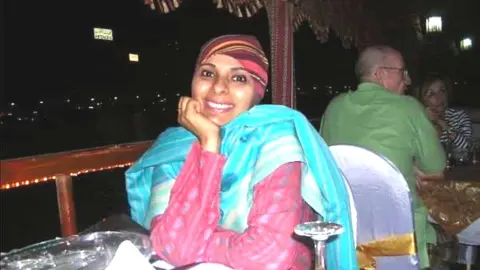 Silvat Zafar
Silvat ZafarPakistan has the highest rates of breast cancer in Asia. Early detection is essential for treatment but medical experts fear many women are not coming forward due to a culture of modesty.
Breast cancer claims the lives of more than 17,000 women in Pakistan every year, according to the World Health Organization (WHO), although charities and doctors in the country claim the annual figure is closer to 40,000.
They say the disease affects one in every nine women in the country, but that cultural and social taboos make it very hard for women to get the help they need to survive.
"Breast cancer is associated with women's sexuality so it becomes a taboo subject in Pakistan," says Omar Aftab, from the breast cancer charity Pink Ribbon Foundation. "Rather than seeing it as a disease, it's a sexuality issue."
Survivors say it's a "lonely journey".
'I put my family first'
Primary school teacher Silvat Zafar was in her twenties when she discovered a lump in her breast. She decided to hide it from her family, who were all getting ready for a holiday to Disney World at the time.
"In our society girls stay quiet about personal things," she says.
"You just don't talk about it. I couldn't say 'breast cancer'. My mum had passed away, and being the only female in the family, I kept quiet."
During the vacation Silvat hid her growing lump by wearing baggy clothes, and couldn't openly discuss the excruciating pain she was going through.
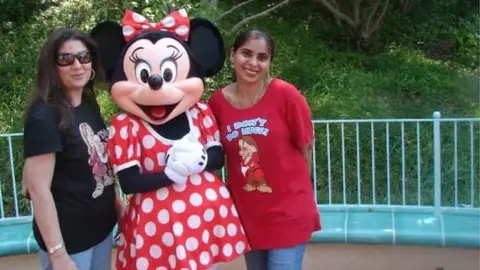 Silvat Zafar
Silvat ZafarBy the time she got help, six months later, she had stage 3 breast cancer, which meant the tumour had grown bigger and there was a risk of the disease spreading in her body. Even at this advanced stage, her treatment was still effective.
Silvat's situation is familiar to Dr Huma Majeed, one of Pakistan's leading breast surgeons. She runs a clinic at the Ittefaq Hospital in Lahore, where she treats hundreds of breast cancer patients.
"Women don't put themselves first as they worry about the family," she says.
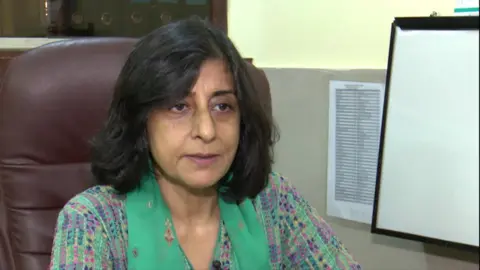
Being "shy" about discussing breast cancer is just one of the issues that prevent women in Pakistan from getting help. Many women - and their husbands - are reluctant to be checked by a male surgeon, as it concerns an intimate part of their body.
But she cites other reasons too.
"In a patriarchal society like Pakistan, women's health is often low down on the agenda," says Dr Majeed.
"Many are dependent on the male members to take them for treatment, which usually is only available in the bigger cities."
There's an economic factor at play, too.
If a woman needs treatment and has to travel to one of the big cities, the whole family might have to go with her - men may have to take time off work to accompany female relatives, which means the costs add up. That particularly affects women from poorer backgrounds in rural areas.
Sobia, 20, is having her first post-operative check-up with Dr Majeed, following the removal of a small lump she discovered a few months ago. Last year, she lost her father to cancer, so Sobia gave up her studies and took a job as a teacher to support her younger siblings.
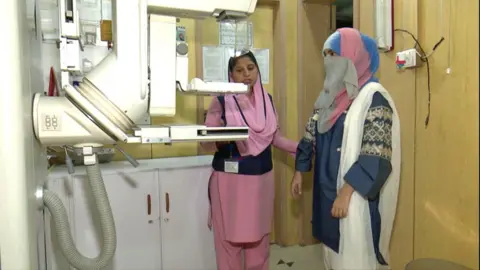
Today, she has travelled for two-and-a-half hours to get to the appointment in Lahore. None of her extended family or friends knows that she has breast cancer, let alone that she is being treated for it. She's told everyone she is in town for some wedding shopping.
"It's a sensitive subject," explains Sobia. "This is a private body part and you cannot discuss it in front of people.
"For young girls especially, it's best to hide the illness as it means you won't get marriage proposals. No-one here wants to marry anyone who has breast cancer.
"First you have to cope with the stress of the illness and then you get tortured about not getting any proposals."
It's been over a decade since Silvat Zafar went into remission, and she now works as a school teacher in Lahore. But the illness still affects her marriage prospects.
"I get many marriage proposals but once they learn I had cancer - even though it's gone - no-one accepts me," she says.
October is breast cancer awareness month, and in Pakistan, charities like the Pink Ribbon Foundation are busy campaigning. They have lit up key buildings like the tourist attraction Minar-e-Pakistan in Lahore and government buildings in Islamabad.
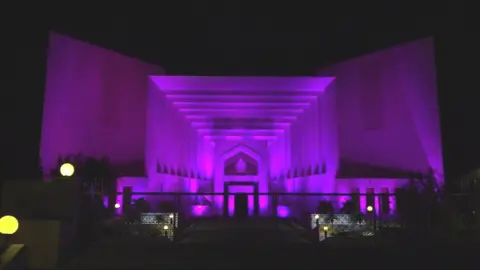
The group was set up 15 years ago and has only recently broken through the taboo to talk about breast cancer openly.
The charity's latest campaign focuses on young girls. They're visiting over 200 colleges across the country to teach girls about early diagnosis and the importance of self-examination.
"Through younger females we can reach older women in the household. When a girl goes home, she can tell her female relatives about checking for breast cancer," says Omar Aftab.
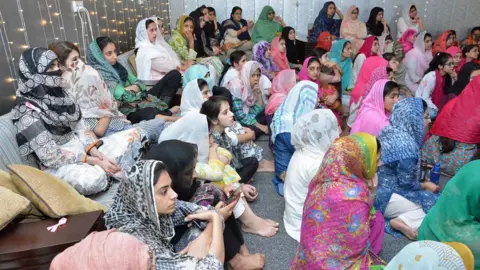
But increasingly breast cancer is affecting younger women. According to the charity and other leading cancer experts in Pakistan, there's been a continuous increase in the number of young girls being treated for breast cancer - some are teenagers.
They blame poor diet, intermarriage - which increases the likelihood of inherited forms of cancer - as well as a lack of specialist care.
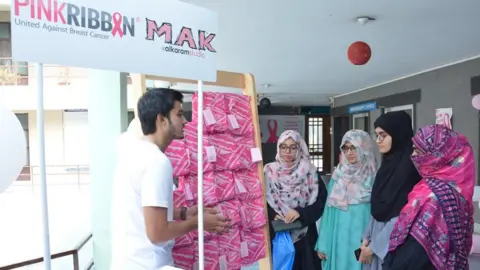 Pink Ribbon
Pink RibbonPlans are under way for the construction of a breast cancer hospital in Lahore. The state-of-the-art medical facility, being built by the foundation, will have everything under one roof, including an all-female staff, from diagnosis to treatment. It will open in the summer of 2020.
The overall message from doctors, charities and patients alike is that attitudes towards breast cancer should change.
Dr Majeed says this will involve targeting men, because of Pakistan's patriarchal society.
"Men need to be educated that this is not a taboo subject," she says. "It's their responsibility to encourage their wives, daughters, sisters and mothers to get checked."
But change is slow. "We've seen a slight change in mindset, but the public still have to raise their voices against the taboo," says Omar Aftab.
Change can't come soon enough for patients like Sobia, who are still afraid to reveal they're undergoing treatment.
"Attitudes have to change," she says. "Support the victim and motivate her, don't criticise."
Silvat Zafar hopes that by sharing her story, she can help other women seek help, before it's too late.
"You can do something about it," she says. "Don't be scared - stand up and win."
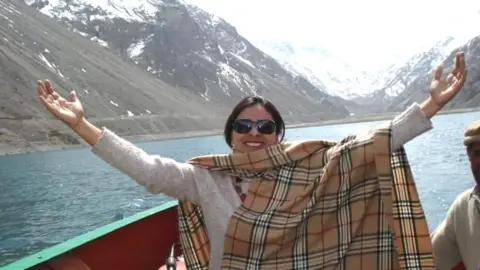 Silvat Zafar
Silvat Zafar*Some names have been changed

